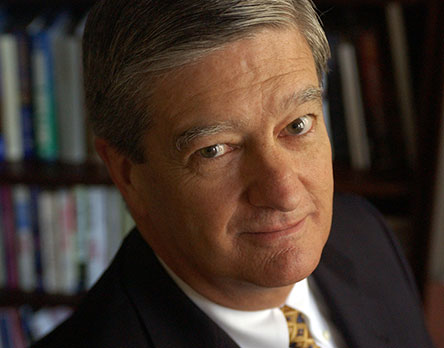Padden: FCC Needs to Set Receiver Standards
Said spectrum ‘squatters’ are running show, not commission

The smarter way to stay on top of the multichannel video marketplace. Sign up below.
You are now subscribed
Your newsletter sign-up was successful
Saying he has no dog in the fight (other than a spectrum-use watchdog), former top DirecTV and The Walt Disney Co. executive Preston Padden said the Federal Communications Commission needs to set strict receiver standards if it is to get the highest and best use out of the valuable spectrum it oversees.
“Our system of spectrum licensing cannot work if entities are licensed for a particular set of frequencies and then the associated industry floods the market with receivers that ‘squat’ over, and preclude the use by others of, a much broader set of frequencies,” Padden told the FCC in an informal comment on the agency’s inquiry into improving receiver interference protections.
Big Tech companies are continuing to try and head off any FCC effort to establish what they said would be “one-size-fits-all” standards for 5G receivers that would work against the regulator’s goals of an innovative 5G environment.
Padden, now an independent consultant, cited his nearly 50 years dealing with spectrum licensing issues in arguing that spectrum “squatters” are effectively the ones allocating spectrum, not the FCC.
Also: CTA Says Receiver Standards Could Stifle Innovation
While Padden said some “middle ground” proposals for freeing spectrum while protecting against interference to receivers have been offered, they won’t work.
What would work, he said, was an idea he credits to Dale Hatfield, executive fellow at the Silicon Flatirons Center, which, like Padden’s consulting firm, is based in Boulder, Colorado. That would be to appoint a special master inside the FCC’s Office of Engineering and Technology — essentially someone with a pocket protector and no dog in the fight — to cut through conflicting claims and studies from incumbents and new users.
“These Special Masters could take testimony or statements, under oath,” he said. “They could initiate discovery, issue subpoenas and cross-examine witnesses. Conceptually, hearings could be conducted by the Commission en banc, by a single agreed-upon commissioner or by an expert from inside or outside the agency.”
Also: FCC's Simington Has Dynamic View of Spectrum Sharing
The FCC in April opened an inquiry into setting wireless receiver standards, one of several routes the agency could take, alone or in tandem, to protect signals in increasingly crowded spectrum bands. FCC chair Jessica Rosenworcel laid out that road map back in April. “We recognize that a variety of approaches may be appropriate, whether through industry-led voluntary measures, commission policy and guidance, or rule requirements where other approaches would be insufficient,” she said after the FCC approved the Notice of Inquiry (NOI).
The NOI was unanimous, but that was not necessarily an indication of any unanimity on which approach to take. At this stage, the NOI is only an effort to collect info on how to improve receiver performance and expand the FCC’s traditional focus beyond transmitters alone. ■
The smarter way to stay on top of the multichannel video marketplace. Sign up below.
Contributing editor John Eggerton has been an editor and/or writer on media regulation, legislation and policy for over four decades, including covering the FCC, FTC, Congress, the major media trade associations, and the federal courts. In addition to Multichannel News and Broadcasting + Cable, his work has appeared in Radio World, TV Technology, TV Fax, This Week in Consumer Electronics, Variety and the Encyclopedia Britannica.

